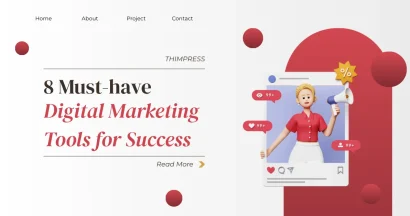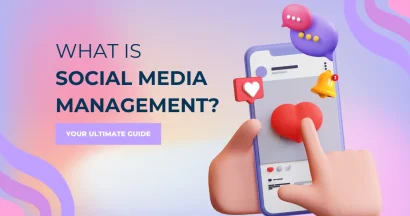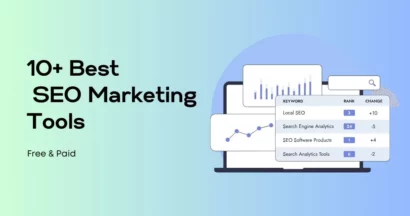Are you spending countless hours on repetitive marketing tasks? From sending follow-up emails to segmenting leads and posting on social media, the manual work can be overwhelming and inefficient. If you’re looking to reclaim your time, scale your efforts, and deliver more personalized experiences, it’s time to embrace the power of marketing automation software.
These platforms are designed to be the central engine of your marketing strategy, handling tedious tasks so you can focus on creativity and growth. They empower businesses to nurture leads, streamline workflows, and measure campaign performance with incredible precision.
To help you choose, we’ve analyzed the market and compiled a list of the top marketing automation softwares available today.
Let’s get started!
Eduma – Education WordPress Theme
We provide an amazing WordPress theme with fast and responsive designs. Let’s find out!
Key Features of Marketing Automation Software
Before diving into our top picks, it’s crucial to understand what makes a platform great. When evaluating options, look for these core features of marketing automation software:
- Visual Workflow Builder: The best tools offer an intuitive, often drag-and-drop, interface to build automated sequences. This allows you to map out the entire customer journey, setting triggers (e.g., form submission) and actions (e.g., send email) with complex logic like delays and A/B splits.
- Lead Management & Segmentation: A powerful platform should help you score leads based on their behavior and segment your audience into targeted groups. This ensures the right message reaches the right person at the right time.
- Multi-Channel Capabilities: Modern marketing isn’t just about email. Look for software that can automate SMS, push notifications, social media ads, and other channels to create a unified customer experience.
- Analytics and Reporting: What gets measured gets managed. Robust reporting features are non-negotiable. You need access to detailed analytics on open rates, click-through rates, conversion, and ROI to understand what’s working and optimize your strategy.
- Integrations: No software exists in a vacuum. Your chosen platform must integrate seamlessly with your existing tech stack, such as your CRM, e-commerce platform, and website builder.
6 Best Marketing Automation Softwares
Here are our top picks for the best marketing automation software, each with unique strengths to suit different business needs.
1. HubSpot Marketing Hub
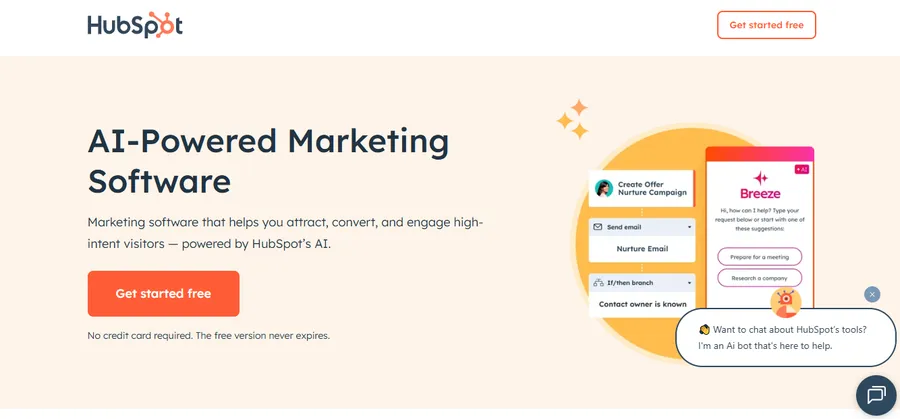
HubSpot is a titan in the marketing industry, offering an all-in-one platform that combines marketing, sales, and service tools. Its Marketing Hub is exceptionally powerful, providing a comprehensive solution for businesses that want a single source of truth for all customer interactions. While it comes at a premium price, its depth and ease of use are hard to beat.
Key Features:
- Seamless integration with HubSpot’s world-class CRM.
- An advanced yet intuitive visual workflow builder.
- Built-in tools for blogging, SEO, social media management, and landing pages.
- Extensive reporting and custom dashboards for deep performance analysis.
Best For: Medium to large businesses seeking a premium, all-in-one solution that can scale with their growth.
Pricing: Limited free tools are available. Paid plans for Marketing Hub with automation start at the Professional tier, which is approximately $800/month (billed annually).
2. ActiveCampaign
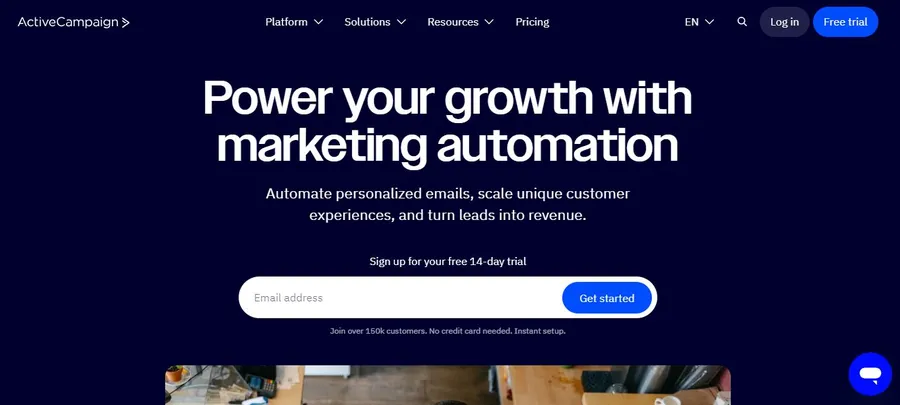
ActiveCampaign excels in providing sophisticated and granular automation. It bridges the gap between marketing automation and CRM, making it a favorite for businesses that need powerful segmentation and personalization capabilities. Its focus on AI and a massive library of pre-built “recipes” (workflows) helps users get started quickly.
Key Features:
- Over 850 pre-built automation recipes, including industry-specific workflows.
- AI-powered features for predictive sending, content generation, and automation building.
- Advanced lead scoring and site tracking to monitor customer behavior.
- Built-in CRM for sales automation and pipeline management.
Best For: Marketers who need deep personalization and complex, trigger-based workflows without the enterprise price tag of HubSpot.
Pricing: Starts at $29/month (billed annually) for the Marketing Lite plan.
3. Klaviyo
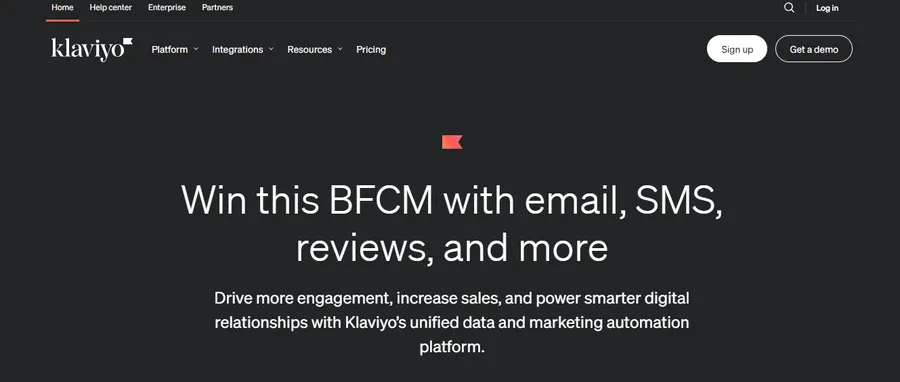
Klaviyo is a user-friendly powerhouse, particularly for e-commerce businesses. Its strength lies in its deep integrations with platforms like Shopify, Magento, and BigCommerce, allowing it to pull in vast amounts of customer data for highly targeted campaigns. Almost everything in the platform, from forms to dashboards, uses an intuitive drag-and-drop editor.
Key Features:
- Best-in-class integration with major e-commerce platforms.
- A large library of high-quality, fully customizable templates for emails and forms.
- Predictive analytics for calculating lifetime value, churn risk, and more.
- Powerful segmentation based on Browse history, purchase behavior, and custom events.
Best For: E-commerce brands of all sizes that want to drive sales through hyper-personalized marketing automation.
Pricing: Offers a free plan for up to 250 contacts. Paid plans start at $20/month.
4. Mailchimp
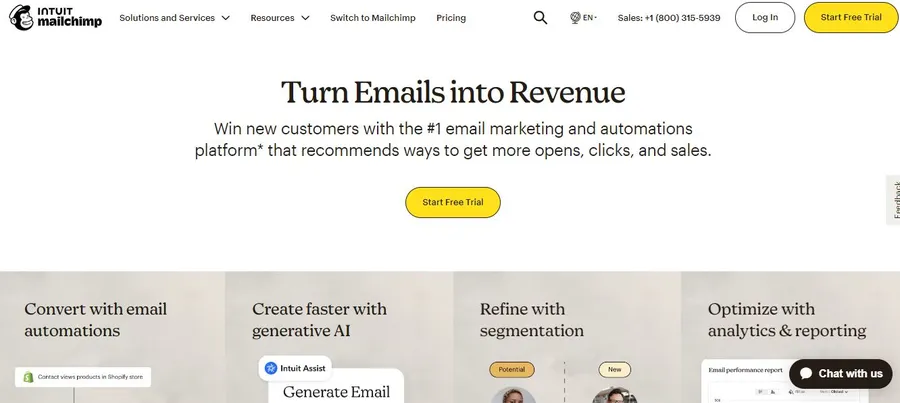
While it started as a simple newsletter tool, Mailchimp has evolved into a robust email marketing automation software with capabilities that now extend into a full marketing platform. Its Customer Journey Builder provides a clear, visual way to create multi-step automated workflows. It’s an excellent starting point for businesses new to automation.
Key Features:
- An intuitive and visually appealing Customer Journey Builder.
- Creative Assistant with AI to help design branded assets for campaigns.
- Tools for building websites, landing pages, and forms.
- Integrations with hundreds of popular apps and platforms.
Best For: Startups and small businesses looking for a user-friendly and well-known platform to automate their email marketing and beyond.
Pricing: A free plan is available for up to 500 contacts. Paid plans start at $13/month for the Essentials tier.
5. Omnisend
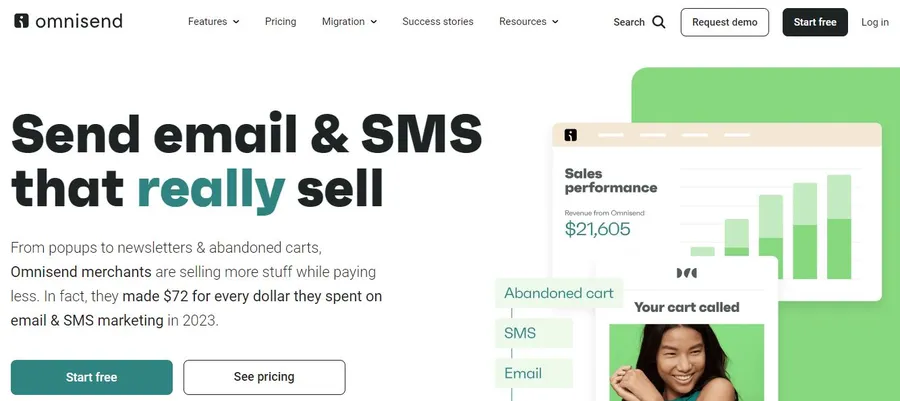
Omnisend is another fantastic marketing automation software for small business, with a sharp focus on e-commerce. It stands out by offering advanced features, like push notifications and robust workflows, even on its free plan. It provides tremendous value for budget-conscious online stores that don’t want to compromise on functionality.
Key Features:
- Automates email, SMS, and push notifications in a single workflow.
- Generous free plan that includes access to most features.
- A large library of pre-built workflows for cart abandonment, welcome series, and more.
- 24/7 email and live chat support for all users.
Best For: Budget-conscious e-commerce businesses that need a powerful, multi-channel automation tool without a high cost.
Pricing: Offers a free plan for up to 250 contacts. Paid plans start at $16/month.
6. Brevo (formerly Sendinblue)
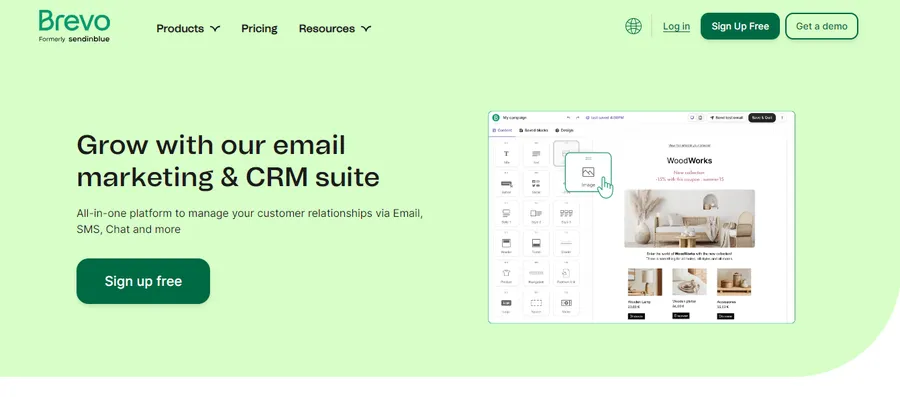
Brevo offers incredible value by bundling marketing automation, a sales CRM, SMS/WhatsApp marketing, and even a meeting scheduler into one affordable platform. While its individual features may not be as deep as specialized tools, the all-in-one package is perfect for businesses looking to consolidate their tech stack without breaking the bank.
Key Features:
- Automates email, SMS, and WhatsApp marketing.
- Includes a built-in sales CRM and meeting scheduler.
- Offers a landing page builder and signup forms.
- Transactional email API for sending order confirmations, password resets, etc.
Best For: Startups and small businesses that need an affordable, all-in-one marketing and sales solution.
Pricing: Offers a free plan with up to 300 emails per day. Paid plans start at just $25/month.
FAQs About The Top Marketing Automation Software
1. What exactly is marketing automation software?
A marketing automation software is a platform designed to help companies streamline, automate, and measure marketing tasks and workflows. Its primary goal is to increase operational efficiency and grow revenue faster by automating repetitive actions like email sends, social media posting, and lead nurturing campaigns.
2. What are the main benefits of using marketing automation?
The key benefits include significant time savings, increased lead generation and nurturing efficiency, improved personalization at scale, better lead quality through scoring, and comprehensive analytics to measure ROI and optimize marketing campaigns.
3. Can small businesses benefit from marketing automation?
Absolutely. A marketing automation software for small business can level the playing field, allowing smaller teams to execute sophisticated marketing campaigns that would otherwise require significant manual effort. Platforms like Omnisend and Brevo are specifically designed to be affordable and scalable for this market.
4. How is marketing automation different from a CRM?
While there is overlap, their core functions differ. A CRM (Customer Relationship Management) is primarily a sales tool used to manage interactions with current and prospective customers. Marketing automation is a marketing tool focused on the top of the funnel—attracting, nurturing, and qualifying leads before they are handed off to the sales team in the CRM. Many platforms, like HubSpot, combine both.
5. How do I choose the right marketing automation software?
The best choice depends on your specific needs. Consider your budget, the size of your team, your industry (e.g., e-commerce), and the complexity of the campaigns you want to run. Start by identifying your primary goals—whether it's improving email marketing or building complex multi-channel journeys—and then evaluate which platform's features best align with those objectives.
Read more:Top 7 Free Education WordPress Themes (with LMS Features)
Contact US | ThimPress:
Website: https://thimpress.com/
Fanpage: https://www.facebook.com/ThimPress
YouTube: https://www.youtube.com/c/ThimPressDesign
Twitter (X): https://x.com/thimpress_com

